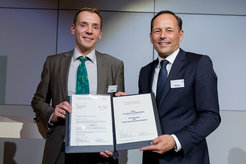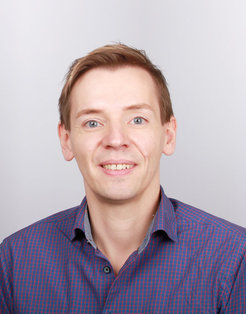Frederik Wurm receives Lecturer Award of the German Chemical Industry Fund
On November 23, 2017, the Lecturer Award (Dozentenpreis) of the German Chemical Industry Fund was presented to Privatdozent Dr. Frederik Wurm of Max Planck Institute for Polymer Research in Mainz.
With the Lecturer's Award, the Chemical Industry Fund recognizes the young scientist Priv.-Doz. Dr. Frederik Wurm for his outstanding achievements in research and teaching. The group leader at the Max Planck Institute for Polymer Research (MPI-P) accepted the award on 23 November 2017 at the 200th meeting of the Board of Trustees of the Chemical Industry Fund at Evonik Industries in Essen. Frederik Wurm is very pleased about the recognition of the fund.

Wurm leads the research group "Functional Polymers" and develops new degradable and molecularly adjustable polymers. Wurm has been particularly interested in biodegradable polyesters based on phosphoric acid in recent years. He has developed new materials to facilitate their interaction with biomaterials, e.g. in human blood. Furthermore, such poly(phosphorester)s are interesting as alternatives to conventional plastics, with the ecological advantage of their degradability. Wurm explains: "We need new plastics that are degradable and can do without toxic additives. Synthetic polymer chemistry can add new, exciting and sustainable materials for the coming decades through controlled polymerization methods and new monomer classes."
The Lecturer Award of the Chemical Industry Fund is awarded to highly qualified junior researchers up to four times a year. The winners must be proposed and undergo a two-stage nomination process.
About the person

Frederik Wurm has been group leader at the MPI-P since 2012. In the summer of 2016 he habilitated on "Polyphosphoresters and Smart Nanocarriers". He has received the Reimund Stadler Prize 2016, the European Young Chemist Award 2014, the GDCh Georg Manecke Prize 2014 and the MAINZ PhD Award for the best doctoral thesis in 2009. Wurm studied chemistry at the Universities of Mainz and Toronto and graduated from the University of Mainz. After postdoctoral work as a Humboldt Fellow at the Federal Institute of Technology in Lausanne, he joined the MPI-P, where he developed new biodegradable polymers, nanocarriers and macromolecular architectures and their application.













